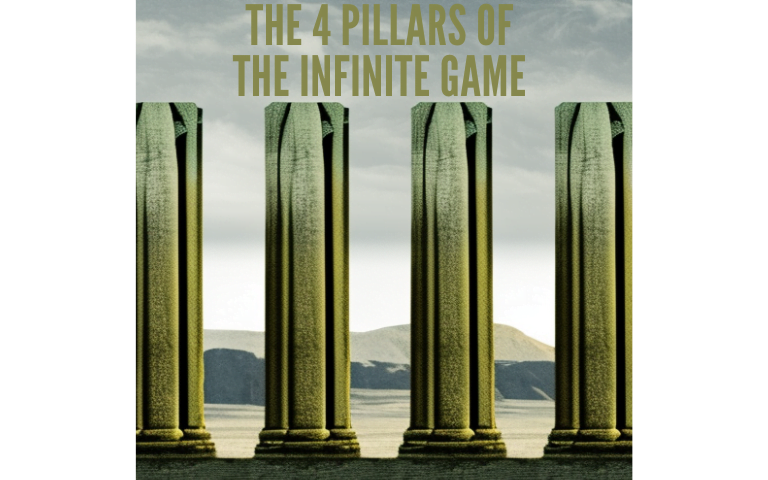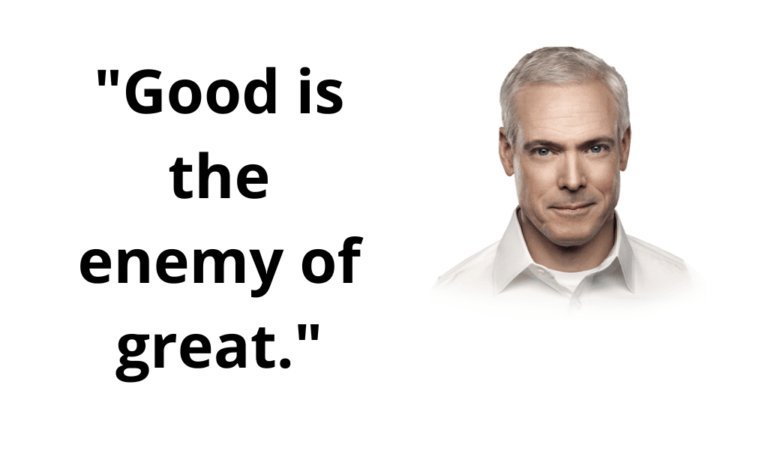Disclaimer: This post may contain affiliate links. For more information, please visit our Disclaimer Page.
Introduction
Simon Sinek‘s “The Infinite Game,” published in 2018, employs game theory to unravel the secrets of sustained business success. Through incisive analysis, he uncovers a powerful truth: embracing the infinite game is the key to creating value and fostering healthy, long-lasting growth.
Sinek masterfully demonstrates that playing for the win, while alluring, is a short-sighted approach that ultimately leads to limited success. By embracing a mindset of playing the infinite game, businesses can secure their place as industry leaders and achieve true, lasting success.
Key Takeaways
The Power of an Infinite Mindset
Simon posits that embracing an “infinite mindset” rooted in a “Just Cause” is the key to success in leadership. A Just Cause, with its unchanging purpose, can endure and adapt, serving a mission that transcends time and is worth pursuing.
However, those who adopt a finite mindset, focusing solely on results without considering a deeper purpose, will fail in the long term. History has shown that numerous organizations and companies, despite initial success, were unable to sustain it due to limited goals and a lack of driving force.
Leaders with a finite mindset focus solely on results, disregarding deeper purpose or meaning. According to Simon Sinek, these approaches are doomed to fail in the long term, as evidenced by numerous organizations and companies who, despite initial success, were unable to sustain them.
The reason?
Their goals were limited and lacked a driving force, a “Just Cause.” Striving for growth or profits without a higher purpose leaves a shallow, unfulfilling legacy. People can find these missions anywhere, but a Just Cause sets you apart and drives you forward with a sense of purpose.
Uncover Your Just Cause
To lead in an eternal game, a leader must possess a crystal clear perception of a future state that transcends the organization, igniting a passion in others to work towards it. This Just Cause imparts a sustained drive beyond momentary incentives and motivates us to continue playing the infinite game.

Most mission or vision statements need more depth, are commonplace or self-serving, and do not qualify as a Just Cause. A definitive Just Cause must embody five attributes:
1 – For something positive
It should embody what the organization stands for, not what it opposes. Adopting a stance against something, such as defeating Apple in market share, portrays the Purpose as a finite game with a definite conclusion.
2- Inclusive
A robust Just Cause inspires individuals to offer their time and resources towards advancing it. Early adopters adopt the Purpose and contribute to it. Infinite-minded leaders seek out employees, customers, and investors who share their Just Cause.
3 – Primarily benefiting others
The Just Cause’s main advantage must accrue to those outside contributors. Leaders must invest their time, energy, and skills to serve those they lead, perpetuating the infinite game. An infinite-minded investor seeks to further a higher cause, which, when successful, can result in substantial profits. A finite-minded investor has a mentality akin to a gambler. This overarching focus on serving others generates loyalty among customers and employees, lending the organization both durability and longevity.
4 – Resilient to political, cultural, and technological fluctuations
The Just Cause must be superior to products or services, as in the infinite game, markets will fluctuate, and technological innovations could render entire product lines obsolete. The Just Cause must be robust, resilient, and timeless for the endless game. Products are merely steps towards advancing the Purpose.
5 – Idealistic, audacious, and unachievable
A Just Cause is an Ideal that remains relevant to inspire future actions, no matter how much has been accomplished. It must always lie ahead, not in the past.
Founders with an infinite vision of the Just Cause must document it so the vision is shared across generations and continues to inspire decisions consistent with it after the founder’s absence.
The 4 Pillars of the Infinite Game
Four key tenets lay the foundation for a long-lasting, purpose-driven approach to leadership: Purpose, Progress, People, and Perspective.

Each of these pillars represents a crucial aspect of embracing an infinite mindset, one that is focused on making meaningful, sustainable progress and that prioritizes people and the greater good above all else.
- Purpose – Meaning – Cultivating a sense of significance outside oneself;
- Progress – Putting forth effort without regard for immediate success.
- People – Developing a bias toward helping others; and
- Perspective – Taking a step back and looking at the big picture;
Application
Understanding the Difference between Finite and Infinite Games
If you are still confused about understanding the difference between Finite and Infinite Games, there is nothing better than Simon himself to explain in this short video.
The Danger of Playing With a Finite Mindset
Microsoft replied to Apple’s introduction of the iPod by producing the tastefully designed, feature-rich Zune to take the market share away from Apple. Apple was not in a rivalry with Microsoft while Steve Jobs was CEO, despite Microsoft’s obsession with Apple. Apple was committed to improving itself. A year after the Zune was introduced, Apple unveiled the iPhone, redefining smartphones and effectively rendering the Zune and the iPod obsolete. The capacity for infinity creates fresh avenues for invention.
Implementing the Principles in Your Own Life
To embody the philosophies of the “Infinite Game,” one must first delve into their motivations and aspirations and assess if they align with a higher purpose.
The journey towards an infinite mindset begins with self-reflection, questioning the “why” behind one’s actions, and seeking fulfillment beyond individual success.
Next, embracing progress over perfection and investing in the journey rather than the destination is key. Celebrating small victories and learning from challenges enriches the experience and ensures sustained growth.

Building trust and cultivating relationships must also be a priority. Trust lays the foundation for meaningful connections, collaborations, and a strong support system.
Lastly, having faith in a better future, and recognizing the impact one can make, drives perseverance and a drive toward a worthy cause. Focusing on these four pillars and striving to live by them can create an endless game of success and fulfillment.
Conclusion
In the final analysis, Simon Sinek‘s “The Infinite Game” is an enlightening and captivating read that delivers a wealth of wisdom regarding the impact of considering the long view. It exhorts its readers to pause and reflect upon the deeper consequences of their choices and to embrace progress even in the face of ambiguity. This literary gem imparts the idea that, even though our lives are limited, we should strive to play an eternal game of self-discovery, advancement, and the pursuit of becoming the epitome of our potential – regardless of the challenges that may arise.
FAQ about “The Infinite Game”
What is “The Infinite Game” about?
“The Infinite Game” is a book by Simon Sinek that explores the concept of leadership and how it can be used to create a more positive and productive workplace. The book emphasizes the importance of playing the “infinite game” of business, focusing on long-term goals and values rather than short-term wins.
What are the main themes of “The Infinite Game”?
Some main themes in “The Infinite Game” include the importance of playing the long game in business and leadership, values and purpose in guiding decision-making, and collaboration and cooperation in achieving success.
What is included in the resume of “The Infinite Game”?
The resume of “The Infinite Game” includes a summary of the book’s key ideas and themes and practical tips and exercises for applying these concepts to one’s leadership style. The resume also provides a brief biography of the author, Simon Sinek.
How can “The Infinite Game” help leaders improve their organizations?
“The Infinite Game” can help leaders improve their organizations by offering practical advice and inspiration for playing the long game in business and leadership. The book emphasizes the importance of values and purpose in guiding decision-making and provides concrete strategies for building a culture of collaboration and cooperation.
What other books has Simon Sinek written, and how do they relate to “The Infinite Game”?
Simon Sinek has written several other leadership and personal development books, including “Start With Why” and “Leaders Eat Last.” These books share many of the same themes and principles as “The Infinite Game,” and offer additional insights and strategies for achieving success as a leader.
“The Infinite Game” Book Quotes
“Life is not a movie. You don’t get the luxury of a perfect ending.”
“Success is a function of persistence and doggedness and the willingness to work hard for twenty-two minutes to make sense of something that most people would give up on after thirty seconds.”
“Trying to win at someone else’s game is a losing proposition.”
“Life is an infinite game. The more generous you are in your approach, the more rewards you will gain.”
“It’s not about winning or losing; it’s about making sure the game never ends.”
“The players of an infinite game are more concerned about the wellbeing of the game itself than about their standing within it.”
“Leadership is a choice to do what’s right, not what’s popular.”
“The desire to be noticed can blind us from seeing the truth.”
“The responsibility of leadership is to create and protect the conditions that enable those in our care to do their best work.”
“The most meaningful victories come from victories of progress, not victories over others.”
You can read Simon Sinek`s Biography by clicking the image below! Enjoy!!!
Disclaimer: This blog post is a summary or resume of the book and is not intended to dispense the reading of the original book. This post aims to provide a general overview of the book’s main ideas and themes and encourage readers to read the complete book to gain a deeper understanding of the material. The information presented in this post is intended to be something other than a substitute for the original book and should be used as a supplement to, not a replacement for, the entire book. We strongly encourage readers to read the complete book to benefit from its ideas and teachings fully.







